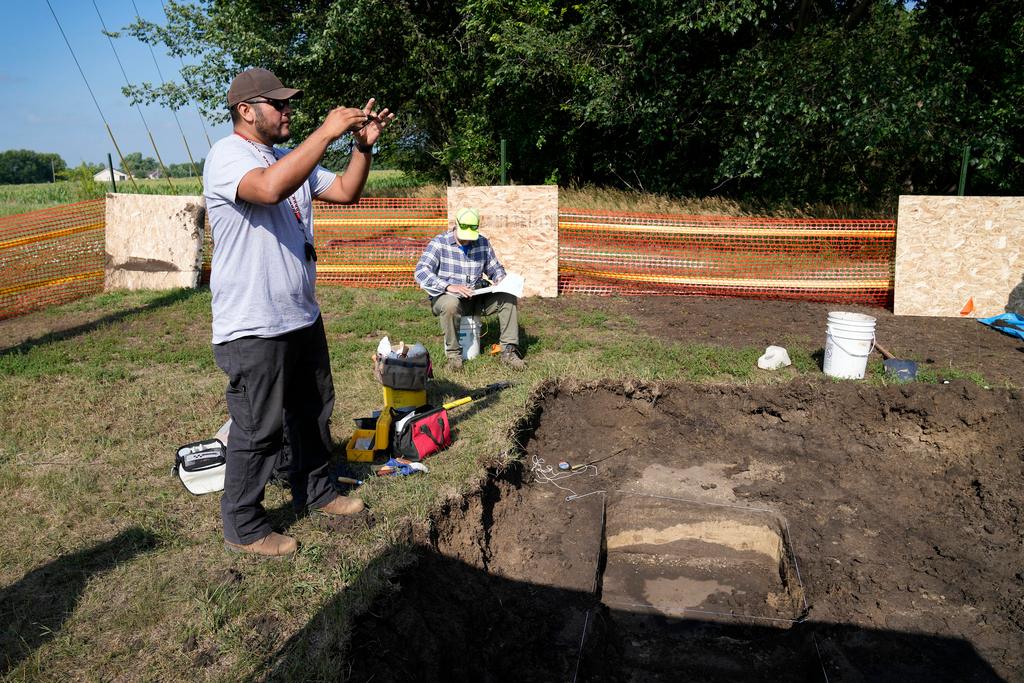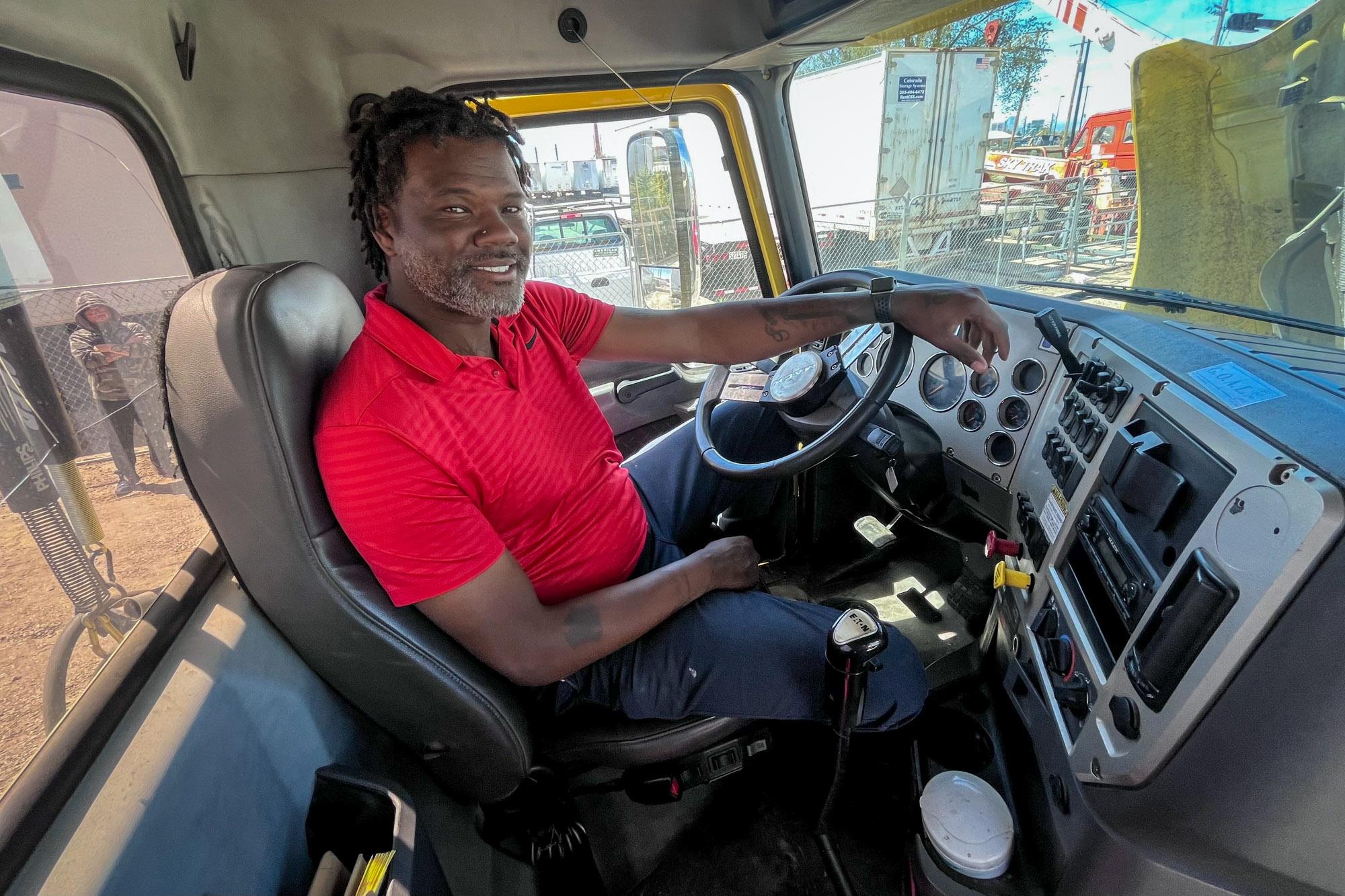
Even with Colorado’s growing diverse population, more than nine out of 10 holders of commercial drivers licenses in the state are male, and, of those who self-reported their race, 91 percent are white.
Shenika Carter is determined to change that.
“This is new trucking,” said Carter, co-owner of Carter Truck Driving Academy, which might be the nation’s only Black-owned truck driving school, with an office in Aurora and a practice yard in Denver. “We do things that are unheard of in our industry — with compassion for people, compassion for humanity, welcoming all ethnicities, all genders.”
Commercial truck driving salaries start at $50,000 a year. But while most employment sectors have committed to diversifying their workforces amidst national race inequity conversations following the murder of George Floyd, trucking remains overwhelmingly white and male.
Colorado’s DMV data shows that of about 130,000 licensed commercial truck drivers, eight percent — or about 1 in 12 — are women. License holders are encouraged, but not required, to report their race, but of those who did, just two percent are Black, and seven percent are Hispanic. For comparison, Colorado’s population is 49.3 percent female, 4.7 percent Black and 22.3 percent Hispanic or Latino, according to the Census Bureau.
So why aren’t there more people of color driving in the trucking industry? Carter and her husband Matthew think it’s because an industry of overwhelmingly white test proctors fail Black and Hispanic license candidates, and non-English speaking candidates at a higher rate than white candidates. The $275 test fee, on top of thousands already paid for training, then could become a barrier to completion for some people.
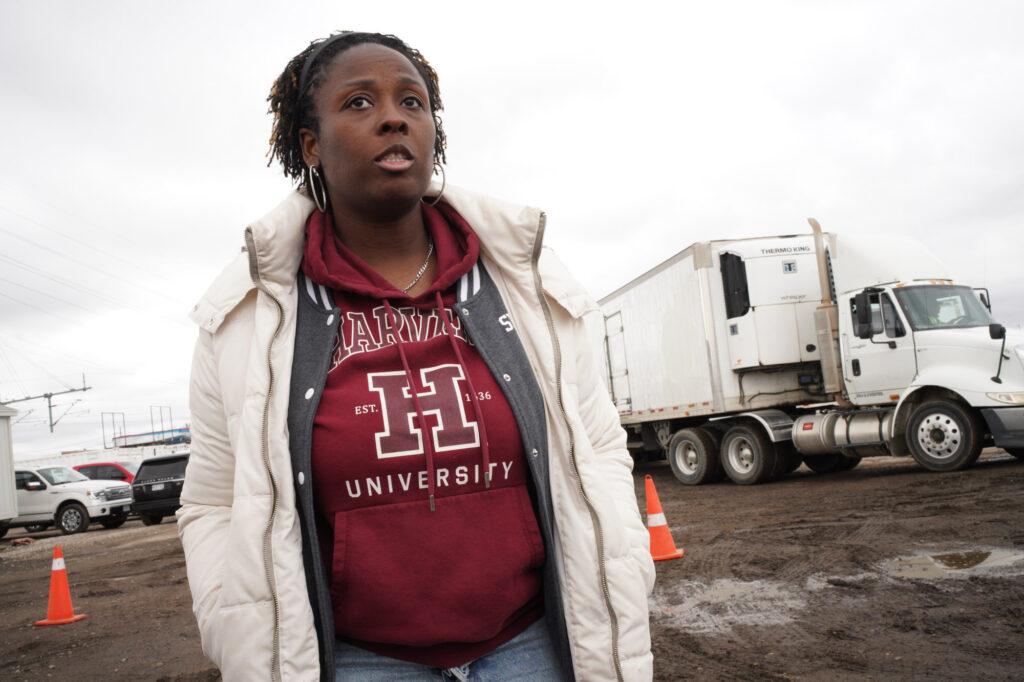
The Carters have plenty of anecdotes to back up their suspicions, but no hard data. That’s because the state doesn’t track Commercial Driver License (CDL) passage rates by race or ethnicity. The legislature has never mandated it, something that one state representative said might need to change.
But rather than wait to be proven right or wrong, the Carters are determined to change the current system.
On a recent day in late spring, Adam Ahmadi, 34, who was born in Iran and grew up in Turkey, was on the lot at the Carters’ school in sneakers and sweats, with his black curly hair in an efficient man-bun.
“I was a mechanic before,” he said. “I have a clue on trucks, cars, you know? I know many things and just the test day, you know, I wanna pass it on the first time!”
That same day was Orgil Gongorsuren’s first day. The Mongolian man was working on getting his visa and needed skills for a good job. When asked if he was having fun, he said, ‘Yeah, it’s fun. It’s all nice. Like kind of not hard, easy, and I’ve been on the road, like, few times.”
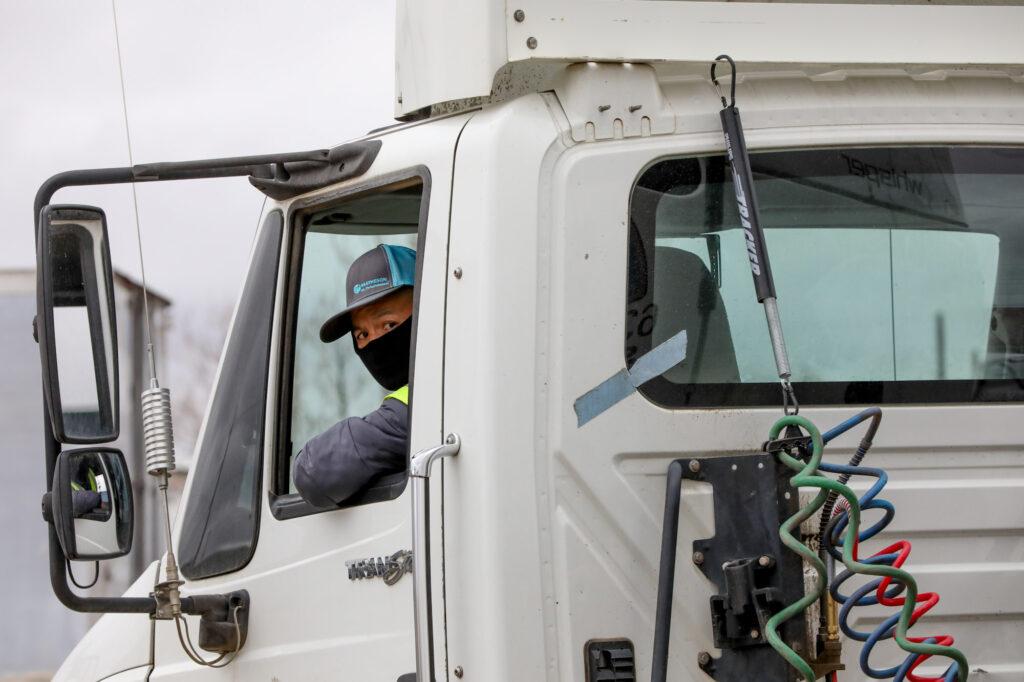
Students like them — there have been about 100 so far — learn how to drive forward and back, park, and maneuver the full-size semi-trailer trucks snug against loading docs and through city streets.
Starting a school wasn’t the couple’s original goal. Their plan was to relocate from Atlanta, where Shenika had her own accounting firm, to the Denver area, where Matthew has a cousin, and start family life anew after the birth of their third child. They chose Colorado because it had lots of hubs and therefore the need for truckers. In 2017, the family of five U-Hauled it to Colorado.
Shenika said to Matt: “Let’s try to see if we can open up our own freight company, hire our own drivers and then start moving freight around locally and then eventually regionally, and then, eventually, across the country.”
They began seeking relationships, trying to get started, but didn’t speed through the process. “A lot of folks were like, ‘Do you have a dock? Do you have this?” Shenika recalled. “And I’m counting our money against what our assets look like or what we’ve acquired. I’m like, ‘eh, nope.’”
Matthew decided to find a truck driving job, but while talking with a prospective employer, an inexperienced driver ran over his foot with a forklift. During a year of recovery that included physical therapy, Shenika picked up some accounting contracts. Matthew then took a job at the United States Postal Service as a union organizer, while they figured out their next route.
Then the pandemic hit. People were having food and supplies delivered, and the Carters heard about supply chain issues, including a shortage of both truckers and truck driving schools. While making contacts to get their freight company moving, Shenika met a woman who worked at a nonprofit, who asked her if she and Matthew might want to train a few students to learn truck driving.
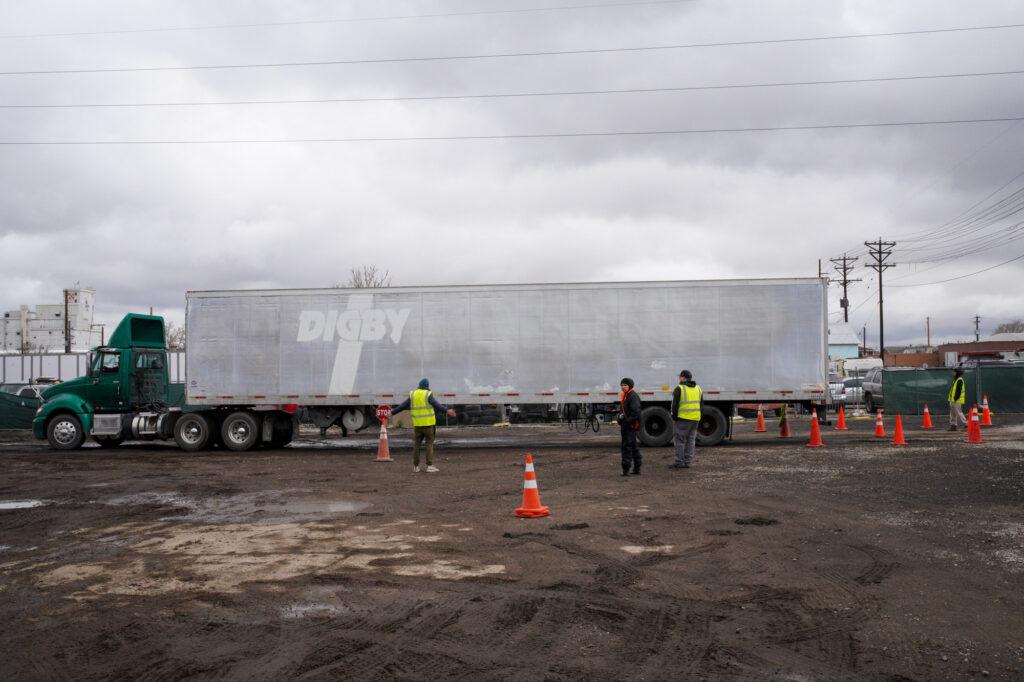
“I’m like, ‘Hmm,’ Shenika recalled. “I said, ‘Matt, do you wanna start, like, a school?’ And he was like, ‘Yeah, why not? I’m sick of the post office. Let’s do it.’ I sat down, wrote the curriculum. It was just supposed to be three to four students a month. This is something small, you know? One truck, one trailer, and just us.”
That’s not what happened.
“As soon as I posted on Facebook ... I got 300 calls in a day,” Shenika said. “My phone was blowing up! I said, ‘Man, maybe we can do an actual school! I Googled. ‘Is there any other Black truck driving schools?’ I couldn’t find any.”
With help from the Colorado Enterprise Fund, a non-profit that helps small businesses get launched, they bought a total of four trucks for students to use. As she began to grow the business, however, there were a few potholes in the road. Other lenders weren’t interested, and some of the instructors she hired left her feeling miffed when they did not show her respect.
“There’s a lot of toxic masculinity,” she said of the trucking industry in general, during an interview in the classroom portion of the school, based in Aurora. “Two of our previous instructors, we eventually had to let go. They were non-Black people, and I felt as if at times they had a problem answering to a Black woman. It was a very toxic situation for me.”
Though at $5,320 for the course, the Carters charged less than others, some interested prospective students didn’t have the tuition money and didn’t speak English. The Carters committed to working with them by creating payment arrangements and helping them find resources, including full scholarships from local Workforce Solutions offices.
“Most truck driving schools, if you don’t have money, they don’t talk to you,” Shenika said. “We worked out deals with folks; we’ve cut our rates, because I see the bigger picture.”
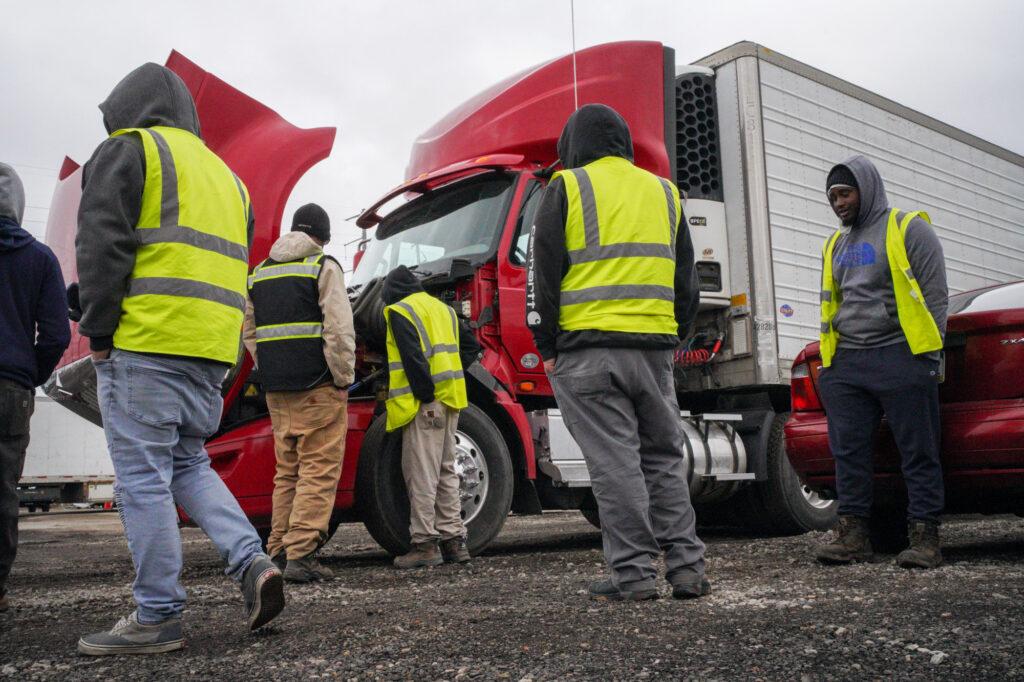
The bigger picture played out recently at the yard, an outdoor space the size of a half-football field where people learn to drive a truck under Matthew’s guidance. Besides a female student, and students Adam and Orgil, there was also Christopher Stratton, a white male who had a welding business he wanted to supplement with trucking, who was nearing the end of the four-week course.
When Stratton, who is white and speaks English as his first language, went to a facility to take his test, he passed. Adam, who has dark skin and speaks with an accident, did not — the first time, anyway. Shenika believes racism is often at the root of the disparity.
“The problem is, the folks doing the testing don’t look like me,” she said. “And so when my students that are immigrant, that are non-English-speaking first language, that are Black, that are identified as woman, they are not passing the test.”
It has caused her such concern that she regularly sends students to different testing companies among the 70 the state authorizes.
“I have left maybe six different testers because of the racism that I experienced trying to book the test,” she said, adding that students have complained of not being understood by the testers – including students who speak English as their native language. “Sometimes we’re stuck with these racist, biased folks doing the state testing,” she said.
Berlynn Moore was a trucker before finding out about Carter Truck Driving Academy. She raced over to apply for a job when she learned about the driving school on social media.
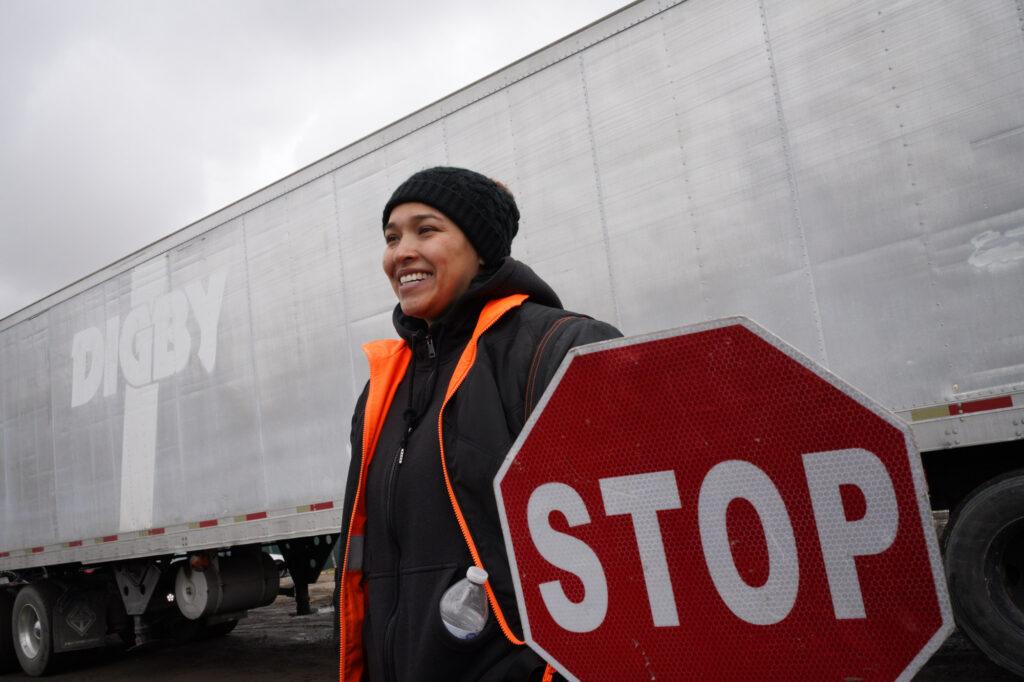
Moore recalled that before becoming an instructor, she herself had a difficult testing experience. She was on a road test with a woman, and it seemed like things were going fine until the tester gave Berlynn an instruction she wasn’t expecting. “She said, ’Drive back to the yard, you failed.’ I said, ‘What did I do?’ She said, ‘You hit the curb.’”
Moore knew that wasn’t true. “If you hit the curb, the trailer pops, you’re going to hear a noise. I didn’t hit the curb.”
But that’s not how the tester saw it. According to Moore, “She said, ‘If you don’t have a camera on your trailer, it’s your word versus my word.’’
Anecdotal examples from Moore and Carter don’t prove whether students of color or students who speak English as a second language have a harder time passing the test. The Colorado Department of Motor Vehicles does not require students taking commercial drivers licensing tests to indicate what race they are, so pass/fail rates cannot be determined based on race. Derek Kuhn, spokesperson for the DMV, said that only about one-third even fill out the voluntary race question on the application for a license, and that therefore it’s impossible to know whether complaints like Berlynn’s are backed up by statistics.
But Colorado state Rep. Leslie Herod, who has been following Shenika Carter on social media and has spoken to her once on the phone, thinks perhaps the state should be more vigilant about documentation.
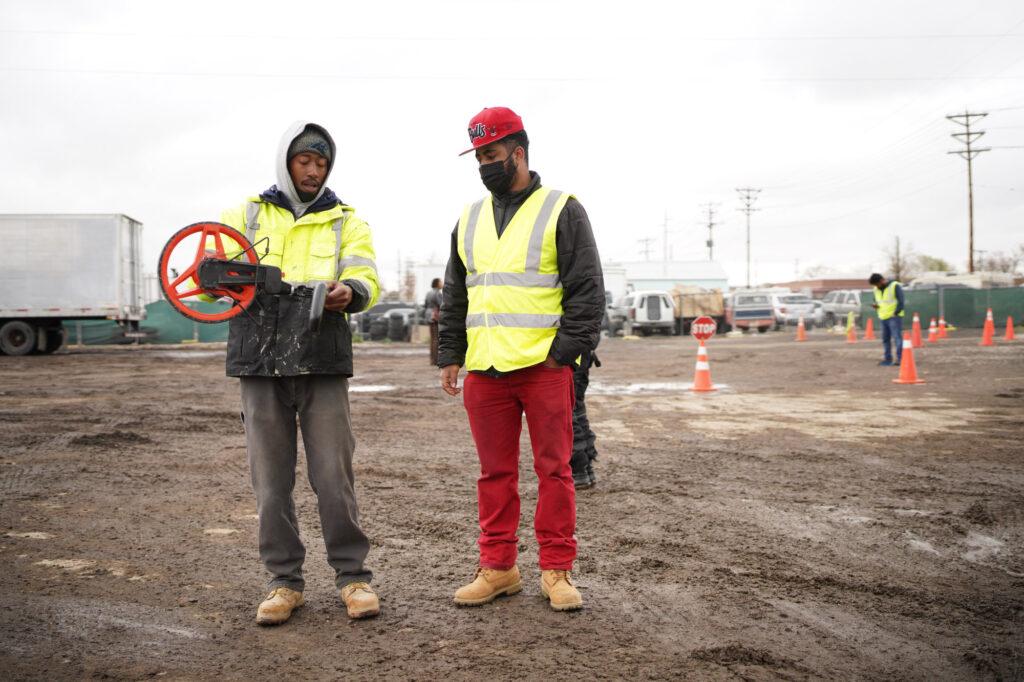
“I think what Shenika and others are doing around ensuring that there are more Black people specifically, but people of color in the trucking industry is extremely important,” Herod said. “They found a problem and a niche and a solution to that problem, but in that work, they have found that there [are] so many other layers of inequities that exist within our licensing process, in the state of Colorado and quite frankly, throughout the nation.”
She said Shenika’s concerns give her pause too.
“After beginning the dialogue about what’s going on in the trucking industry because of what Shenika is doing, it leads me to question whether or not we are collecting the right data,” Herod said. “Whether we are standing behind our values to ensure that our licenses in Colorado reflect the diversity of our state.
“I will be working with the Department of Revenue [under which the DMV falls] and others to look at if there are other things that we need to collect when it comes to data.”
The system’s problems are ones Berlynn Moore is trying to work around – at least when it comes to her working with the students at Carter Truck Driving Academy for whom English is a second language.
She recalled one student who spoke mainly Arabic.
“He asked me, can I just be patient with him, and ever since then, I’ve just been patient with him,” Moore said. “He’ll tell me, like, “You show me,’ and I, I can show him. So we make it work, you know?”
She gave him a list of the words he needed to know in English in order to pass the test.
“And he learned it. He got his CDL, all right,” she said.
And so did Adam Ahmadi, when he went back for a second shot.
“I passed my test and I found job,” Ahmadi said in a text earlier this month. “It is possible I go to work next week.”
Those outcomes make the challenges of running the school worthwhile for the Carters.
“It’s a sure way out of poverty,” Shenika said. “A for-sure way.”







